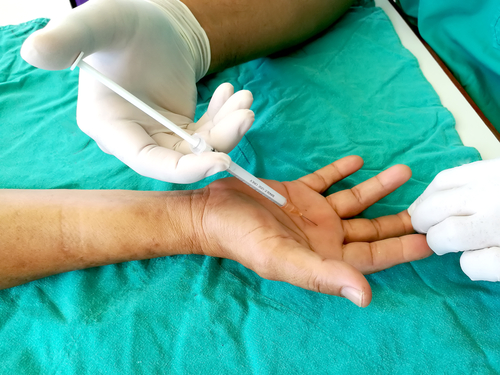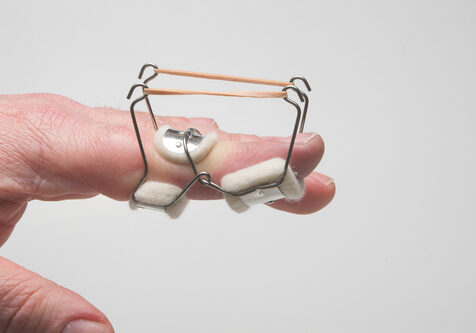By: Shruti Jani
Patients will often times ask the therapist their opinion on cortisone injections. Cortisone injections can be very helpful and significantly reduce inflammation, however, some therapists feel this can mask the pain not treating the true root cause of the problem. This is often debated among therapists. A short synopsis of the pros and cons of cortisone injections will be provided.

Cortisone injections are a type of steroid that has been used in orthopedic conditions to
reduce inflammatory response and pain. Cortisone mimics our body’s natural corticosteroid
hormones (cortisol) produced by the adrenal glands. Cortisone is mainly an anti-inflammatory
medicine, not a painkiller. However, pain is often diminished once the inflammation goes down.
Cortisone is effective in conditions such as arthritis, tendonitis, bursitis, frozen shoulder, plantar
fasciitis, carpal tunnel syndrome, herniated disc, rotator cuff injuries, and more.
Cortisone injections are often recommended if the pain is localized and not controlled by
first-line anti-analgesics. It works directly at the site of inflammation leading to a direct target
effect, and this, in turn, also leads to a reduction in pain. However, some side effects and
disadvantages should be considered for cortisone treatment.
Advantages
- Small dosages can prove effective for some patients
- Cortisone is a naturally occurring substance in the body, so most patient tolerates the
dosage - A patient may only feel minimal discomfort
- Cortisone injections have few but usually tolerable side effects, i.e., palpitations, tremors,
skin site erythema, and facial flushing. - Drug’s effect is limited to a specific area.
Disadvantages
- High concentration or repetitive use of medication can damage tissue in the body. This
may also lead to the weakening of the tendons or softening of the cartilage. - Repetitive cortisone may cause damage to the joints of healthy tendons of young people.
Oral anti-inflammatory medications, ice and heat applications, and physical/occupational
therapy should be attempted first in the case of young individuals. - Certain tendons (E.g., Achilles tendon) are prone to rupture when treated with cortisone
injections. - Other serious but rare adverse events include bone necrosis, joint infection, nerve
damage, a serious increase in blood sugar, and a weakening of the immune response.
Cortisone injections are an excellent treatment option for many inflammatory conditions
with various advantages. Caution should always be undertaken to reduce the possibility of adverse
outcomes.
References:
Jonathan Cluett, M. D. (2022, January 28). Are cortisone injections bad for you? Verywell
Health. Retrieved October 29, 2022, from https://www.verywellhealth.com/are-cortisone-
injections-bad-for-you-2549575
Mayo Foundation for Medical Education and Research. (2021, May 20). Cortisone shots. Mayo
Clinic. Retrieved October 29, 2022, from https://www.mayoclinic.org/tests-
procedures/cortisone-shots/about/pac-20384794
Urgent Care Omaha. (2019, September 16). Cortisone Shots Pros & Cons: Urgent Care Omaha
& Bellevue, NE. Urgent Care Omaha. Retrieved October 29, 2022, from
https://urgentcareomaha.com/cortisone-shots-pros-cons/
2 Comments
Leave a Comment
More To Read
Prevention and Management of UE injuries in Modern Mass Production
Reference: Pitts, G., Custer, M., Foister, R. D., & Uhl, T. (2021). The hand therapist’s role in the prevention and management of upper extremity injuries in the modern mass production industrial setting. Journal of Hand Therapy, 34(2), 237–249. https://doi.org/10.1016/j.jht.2021.04.019 By: Kaylen Kallander The Skinny: This study included four case studies to determine the impact of…
Read MoreHow Weather Changes Affect Joint Pain
By: Lucas Godwin How Weather Changes Affect Joint Pain Numerous potential factors can cause weather-related joint pain, including humidity, temperature, precipitation, and changes in barometric pressure. Scientists have performed many studies on joint pain and weather over the years, but so far, none can say for sure what the connection is. Timmermans et al., 2015…
Read MoreManagement of the Stiff Finger: Evidence and Outcomes
Title: Management of the Stiff Finger: Evidence and Outcomes Reference: Yang, G., McGlinn, E. P., & Chung, K. C. (2014). Management of the stiff finger: Evidence and outcomes. Clinics in Plastic Surgery, 41(3), 501–512. https://doi.org/10.1016/j.cps.2014.03.011 Article Review By: Tommi Hintnaus The Skinny: This study focuses on understanding and managing finger stiffness, a condition characterized by…
Read MoreSign-up to Get Updates Straight to Your Inbox!
Sign up with us and we will send you regular blog posts on everything hand therapy, notices every time we upload new videos and tutorials, along with handout, protocols, and other useful information.





Good information. As a hand therapist I often am at a loss as to whether I should encourage patients to get an injection. Every doctor has a different opinion and I don’t like to contradict them. This provides basic objective info. No opinions. Thank you
You mentioned repetitive cortisone injections – Can you clarify what the risk scale is for repetitive use?
I am not an injecting therapist but have been led to understand the following:
– that if a steroid’s beneficial effect wears off within 3 months then it is not advised to have another and to seek alternative treatments,
– that people can have more than one injection, up to approx 3/year, (if needed) ? in the same location
How many is too many? (some people have more than 3 over a couple years).
I don’t know if you can answer these questions but I am just curious to get some clarity because these are also questions people ask.